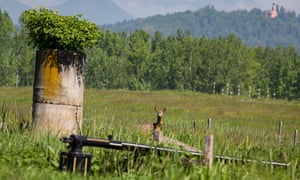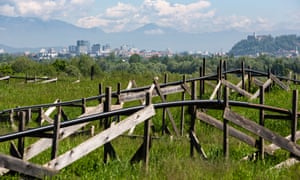From the lush green hill you can see Ljubljana, the capital of Slovenia, in the distance. Populations of deer, rabbits and turtles live here. The air is clean and the only signs that we are standing above a 24-metre (79 feet) deep landfill are the methane gas pipes rising from the grass.
Ljubljana is the first European capital to commit to going zero-waste. But fifteen years ago, all of its refuse went straight to landfill. “And that is expensive,” says Nina Sankovič of Voka Snaga, the city’s waste management company. “It takes up space and you’re throwing away resources.”
So the city decided to change course.


- A deer grazes on Ljubljana’s old landfill site; the city is a backdrop to the site’s green spaces and methane pipes
It began in 2002 with separate collection of paper, glass and packaging in roadside container stands. Four years later, the city began collecting biodegradable waste door to door; separate collection of biowaste is set to become mandatory across Europe in 2023, but Ljubljana was nearly two decades ahead of the curve. In 2013, every doorstep in the city received bins for packaging and paper waste. And, most controversially, scheduled collections of the residual waste were cut by half – forcing people to separate their rubbish more efficiently.


